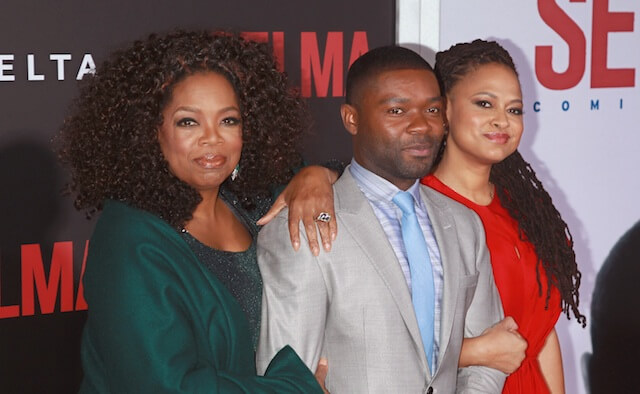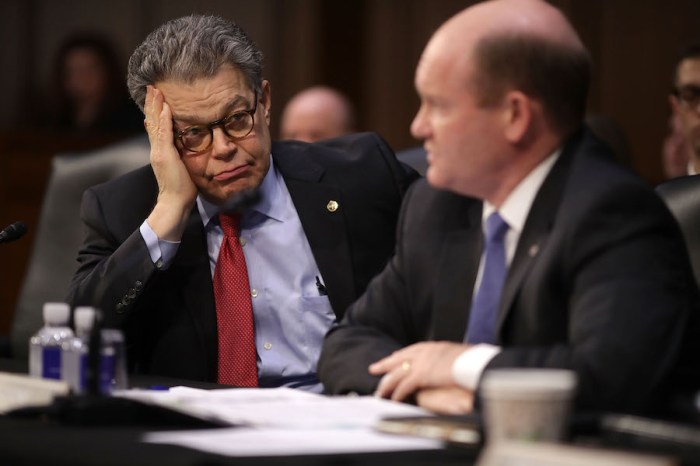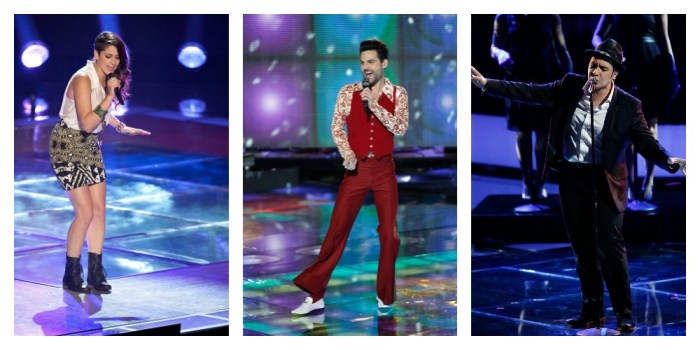Oprah Winfrey, David Oyelowo and Ava DuVernay talk ‘Selma’

Getty Images
The press junket for “Selma,” Hollywood’s first film about Martin Luther King Jr., takes place the day after major protests were held in New York City, Washington D.C. and Chicago for the police brutality that resulted in the deaths of Michael Brown and Eric Garner. The subject was unavoidable, especially as the film speaks to many of the issues gripping today’s marches: the racial divide that persists even today; the efficacy of protests; the need for a clear and focused message to effect real change. Here are what star David Oyelowo, director Ava DuVernay and co-producer Oprah Winfrey, who also plays protestor Annie Lee Cooper, had to say:
Ava DuVernay: “No one her wanted to make a film about a statue or a speech or a street name or a catchphrase — all the thing that I feel King has been reduced to. He was a dynamic, charismatic, brilliant mind. He was a man of faith who was sometimes unfaithful. He was guilty, he was depressed, he had an ego, he liked to laugh, he was a prankster, he was a human being. There hasn’t been a film made with Dr. King at the center, at least by a studio, ever. When we were charged to do this our main goal was to show him in all his complexity, unlock him from the statue and let him live and breathe.”
David Oyelowo: “Dr. King did not think of himself as an icon. He did not walk around thinking of himself as a historical figure. He was a man. And I’m not him. The thing that I could seize upon is he was a father of four, as I am; he was Christian, as I am; he was someone who valued justice, as I do. Those were my entry points. One of the most valuable sources I had was finding Andrew Young. I spent a lot of time with Ambassador Young, and he talked to me about his friend. He talked about the prankster, the father, the man who was at times unsure. That was the foundation upon which I had to build.”
Oprah Winfrey, on why she had to play Annie Lee Cooper: “Because Ava made me do it. Ava sent me an online piece regarding the real Annie Lee Cooper, from the Selma newspaper when she celebrated her 100th birthday in 2010. It talked about her life and her memories of that time in Selma when she actually knocked out the sheriff. And at the end of the piece it said that every day she watched ‘The Oprah [Winfrey] Show’ at 4:00 with a tuna fish sandwich. [DuVernay] said, ‘Don’t you think it would mean a lot to her that you, who she watched everyday at 4:00 with a tuna fish sandwich, was portraying her?’ That was it.
“More importantly It was for every other woman and man in history who took that walk to the register’s office and was turned down and then went home and tried it another year. And then went back and tried it another year. This was Annie Lee Cooper’s fifth time [as seen in the film]. When we think about what it takes to keep getting up and saying, ‘I will and I can in the face of an entire society that says you cannot and you will not.’ I just wanted to able to take a few minutes in that walk and pay tribute to all those people.”
DuVernay: “A risk to me as a filmmaker would be to make a film that feels like medicine or spinach. We’re on the other side of that now, but it feels good. But facing the idea of making a film about Dr. King — it’s like, how do you do that? How do you make that feel urgent and vital and immediate and not like a dusty history book? The way you do it is you focus on story and character. You have to be telling the truth about people. That’s the one way to do that, to make this not feel like an after school special. That something I don’t think anyone here was interested in. I don’t think a standard script approaching this material would have attracted this caliber of cast or collaborators.”
Winfrey: “I don’t think you know yourself and you don’t know where you’re going unless you know where you’re coming from. Maya Angelou has a wonderful poem called ‘To Our Grandmothers’ in which she says, “I come as one but I stand as 10,000.” I’ve been in multiple meetings where I was the single woman and the single black person in a 50-mile radius. But I stepped into that room as one and came with 10,000 and 10,000 and 10,000 in my back my sides. Knowing that means I can go anywhere, I can do anything, because I recognize where I come from and what I’ve come from. The Annie Lee Coopers of the world — a lot of whose names didn’t make the history books — were equally important in the courage they demonstrated, daily, to stand inside and stand up for themselves.”
DuVernay, on the protests: “It’s jaw-dropping that this piece of art can meet this cultural moment, which is so rich and so robust and so bursting with the energy of people. This film is about voice; this film is about being heard. We’re sitting here in this hotel doing interviews about how these marches change the nation while I hear people marching outside. One of the things about making a film like this, a film about history, is you worry about making it relevant, something that people can themselves in. But we are experiencing these things right now. This film took a long time to get made. We had to make it very quickly; we had 32 days to run and shoot. And the timing was perfect. This film, not to overstate it, is here for a reason, in this moment. We just hope we can add to the conversation of what’s going on. What a vibrant time in our times to see this nation galvanize around this.”
Oyelowo, on the parallels between Selma and Ferguson: “When it was voting rights being asked for, it was a black problem; once Bloody Sunday happened and the country saw those images, it became an American problem. In Ferguson, when it was just about Ferguson, it was a black problem; when the country saw the injustice of what happened to Eric Garner, it became an American problem. That was the point at which blacks and whites came together and these marches really gained momentum. In that instance in Selma, the problem was voting rights and there was federal intervention, because what you had was a situation where, by want of a better phrase, the game was rigged. If a black person was killed and someone was brought to trial, they most likely got off because it was a white jury of their peers. We have a situation now where we need police reform, and the game is rigged again. I would say we need federal intervention again.
“But we also need to focus on what are the demands. My fear at the moment is we have this amazing slew of protests but we don’t have someone like Dr. King articulating what it is we want and what we need. We need clear intentions. That’s not to say we need a Dr. King in order to do that, but what I hope ‘Selma’ shows is that clear intention: what we are asking for and how we are going to ask for it in a tactical, politically savvy way. I really hope and pray our film shows what was effective in the past and how we can be effective going forward.”
Follow Matt Prigge on Twitter @mattprigge


















